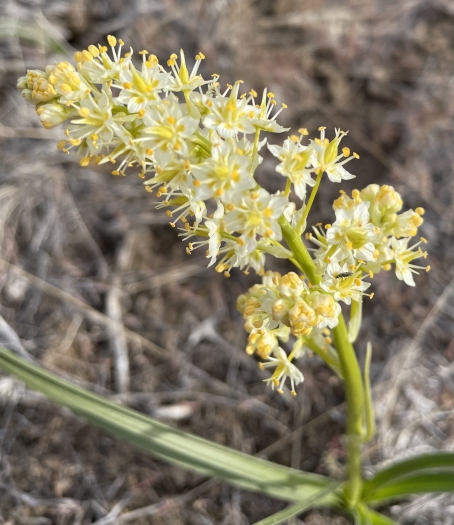Foothill Deathcamas
(Toxicoscordion paniculatum)
Foothill Deathcamas (Toxicoscordion paniculatum)
/
/

Henrik Kibak
CC BY 4.0
Image By:
Henrik Kibak
Recorded By:
Copyright:
CC BY 4.0
Copyright Notice:
Photo by: Henrik Kibak | License Type: CC BY 4.0 | License URL: http://creativecommons.org/licenses/by/4.0/ | Rights Holder: Henrik Kibak | Publisher: iNaturalist | Date Created: 2021-04-29T14:55:08Z |

























Estimated Native Range
Summary
Toxicoscordion paniculatum, commonly known as foothill deathcamas, is a perennial herb that is native to the western United States, but its range is more accurately confined to the grasslands and open woodlands of the Pacific Northwest, including parts of California, Oregon, and Washington. It typically grows to a height of 7 to 28 inches (18 to 71 cm). The plant features narrow, grass-like leaves and a flowering stem that bears clusters of cream-colored flowers with distinctive yellowish-green glands at the base of each petal. These flowers bloom from late spring to early summer and are not particularly showy, but they do provide a subtle beauty to their native habitats.
Foothill deathcamas is not commonly cultivated due to its toxicity; all parts of the plant, especially the bulbs, contain toxic alkaloids. Despite its poisonous nature, it is an important component of native ecosystems, offering ecological value to certain pollinators. In cultivation, it would require well-drained soils and full sun to part shade conditions. It is drought-tolerant once established, reflecting its adaptation to dry, open areas. There are no popular garden cultivars of this species due to its toxic properties. Gardeners should exercise caution and not plant foothill deathcamas in areas accessible to children or pets.CC BY-SA 4.0
Foothill deathcamas is not commonly cultivated due to its toxicity; all parts of the plant, especially the bulbs, contain toxic alkaloids. Despite its poisonous nature, it is an important component of native ecosystems, offering ecological value to certain pollinators. In cultivation, it would require well-drained soils and full sun to part shade conditions. It is drought-tolerant once established, reflecting its adaptation to dry, open areas. There are no popular garden cultivars of this species due to its toxic properties. Gardeners should exercise caution and not plant foothill deathcamas in areas accessible to children or pets.CC BY-SA 4.0
Plant Description
- Plant Type: Bulb
- Height: 1.75-2.5 feet
- Width: 0.5-1 feet
- Growth Rate: Moderate
- Flower Color: Cream, Yellow
- Flowering Season: Spring
- Leaf Retention: Deciduous
Growth Requirements
- Sun: Full Sun, Part Shade
- Water: Low, Medium
- Drainage: Medium
Common Uses
Butterfly Garden, Low Maintenance
Natural Habitat
Grasslands and open woodlands of the Pacific Northwest
Other Names
Common Names: Foothill Death Camas, Panicled Zigadenus, Meadow Death Camas, Sand-Corn, Panicled Death Camas
Scientific Names: , Toxicoscordion paniculatum, Gomphostylis paniculata, Helonias paniculata, Zigadenus paniculatus,
GBIF Accepted Name: